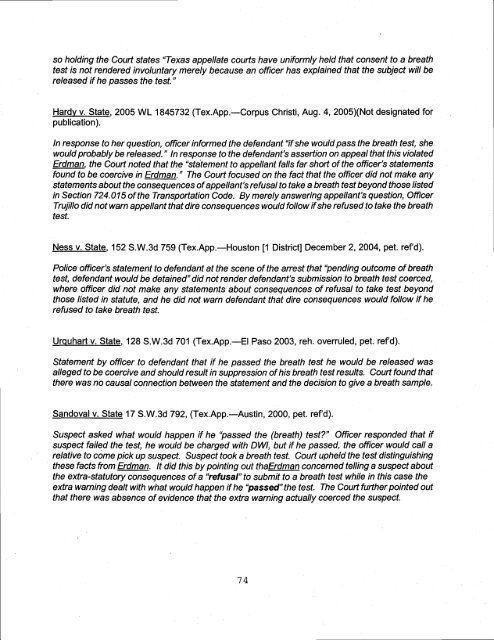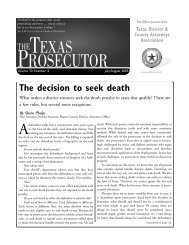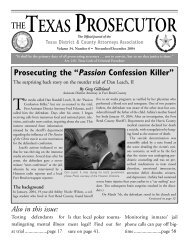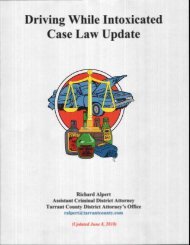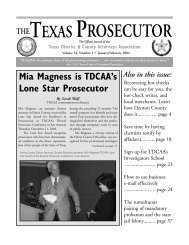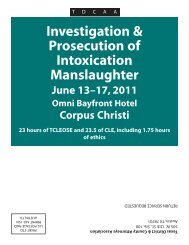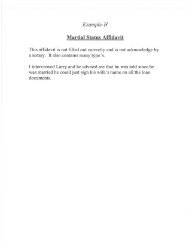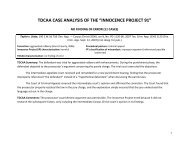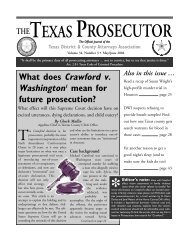Driving While Intoxicated Case Law Update - Texas District ...
Driving While Intoxicated Case Law Update - Texas District ...
Driving While Intoxicated Case Law Update - Texas District ...
You also want an ePaper? Increase the reach of your titles
YUMPU automatically turns print PDFs into web optimized ePapers that Google loves.
so holding the Courtsfafes "<strong>Texas</strong> appettate courts have uniformty hetd that consent to a breath<br />
fesf is not rendered involuntary merely because an officer has explained that the subject will be<br />
released ffhe passes fhe fesf."<br />
Hardv v. State, 2005 WL 1845732 (Tex.App.-Corpus Christi, Aug. 4, 2005)(Not designated for<br />
publication).<br />
ln response to her question, officer informed the defendant "if she would pass the breath fesf, she<br />
would probably be released." ln response to the defendant's assertion on appeal that this violated<br />
Erdman. the Court noted that the "stdtement to appellant falls far short of the officer's statements<br />
found to be coercive in Erdman." The Court focused on the fact that the officer did not make any<br />
statements aboutthe consequences of appellant's refusal to take a breath test beyond those listed<br />
in Section 724.015 of the Transportation Code. By merely answering appellant's question, Officer<br />
Trujillo did not warn appellant that dire consequences would follow if she refused to take the breath<br />
fesf.<br />
Ness v. State, 152 S.W.3d 759 (Tex.App.-Houston [1 <strong>District</strong>] December 2, 2004, pet. ref'd).<br />
Police'officer's statement to defendant at the scene of the arrest that "pending outcome of breath<br />
test, defendant would be detained" did not render defendant's submr'sslon to breath test coerced,<br />
where officer did not make any statements about consequences of refusal to take test beyond<br />
fhose listed in statute, and he did not warn defendant that dire consequences would follow if he<br />
refused to take breath test.<br />
Urquhart v. State, 128 S.W.3d701(Tex.App.-El Paso 2003, reh. overruled, pet. ref'd).<br />
Statement by officer to defendant that if he passed the breath test he would be released was<br />
alleged to be coercive and should result in suppression of his breath fesf resu/fs, Courtfound that<br />
there was no causal connection between the statement and the decision to give a breath sample.<br />
Sandoval v. State 17 S.W.3d 792, (Tex.App.-Austin,2000, pet. ref'd).<br />
Suspecf asked what would happen if he "passed the (breath) test?" Officer responded that if<br />
suspecf failqd the test, he would be charged with DWl, but if he passed, the officer would call a<br />
relative to come pick up suspecf. Suspecf took a breath test. Court upheld the test distinguishing<br />
fhese factsfrom Erdman. It did this by pointing out thaErdman concerned telling a suspect about<br />
the extra-statutory consequences of a "refusal" to submit to a breath test while in this case the<br />
extra warning dealt with what would happen if he "passed" the test. The Court further pointed out<br />
that there was absence of evidence that the extra warning actually coerced the suspect.<br />
74


